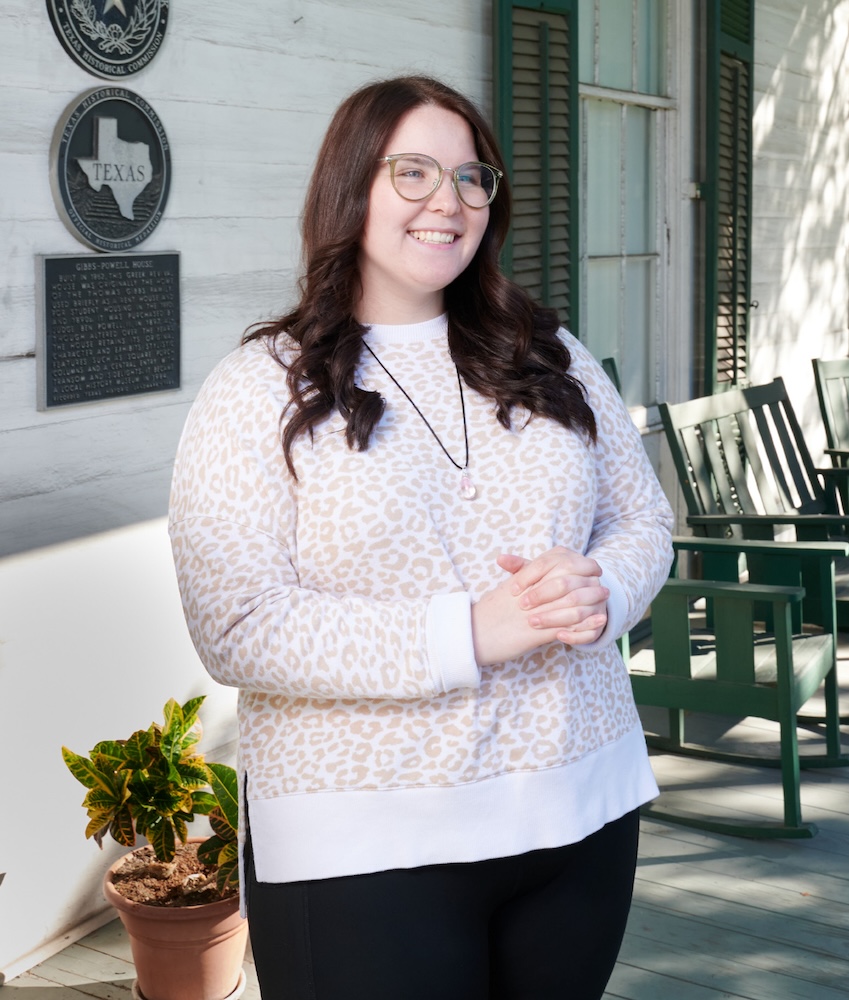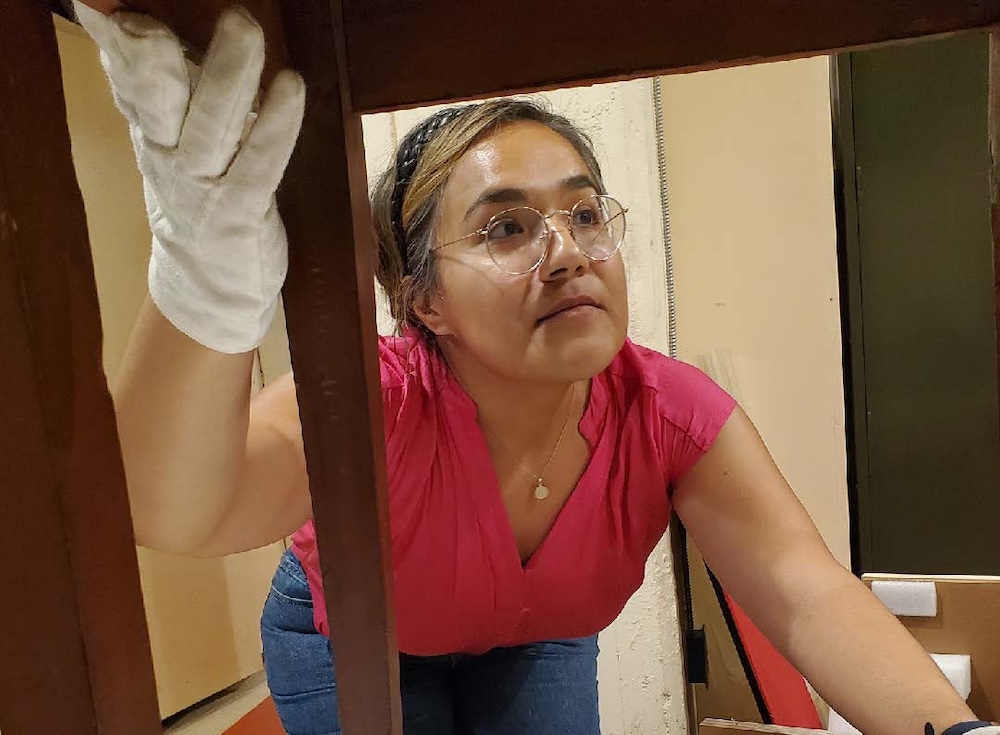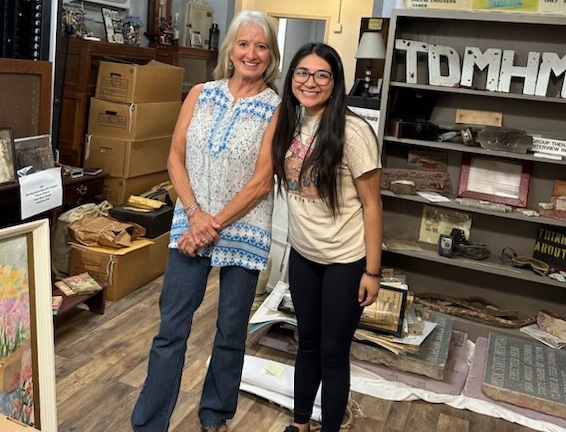Today@Sam Article
Heritage Magazine: Making History
July 1, 2024
SHSU Media Contact: Campbell Atkins
 Those who cannot remember the past are condemned to repeat it.
Those who cannot remember the past are condemned to repeat it.
This sentiment is shared by history lovers across the world as they attempt to sift through the remnants of what we once were to better understand who we are now and where we are heading. While these individuals are critical to our overall advancement, society can sometimes underestimate the diverse career paths available to those with a background in history.
“Usually, history majors are encouraged into classrooms as a lecturer or teacher,” said Ingrid Patino, who earned her master’s degree in history from SHSU and participated in its Public History Internship Program. “While I love teaching history and working with students, going into the classroom didn’t seem like the right fit at the time.”
Patino, who now works at the Holocaust Museum Houston, is a prime example of the program’s benefits and the positive results it can help produce. Zachary Doleshal, clinical assistant professor of history at SHSU, established the program in 2015 alongside history department chair Brian Jordan and has fostered it into a well-oiled machine that offers participants stipends and payment for the work they do.
“It immediately becomes apparent while teaching public history that, if you want your students to take it to the next level, they need to have this experience,” Doleshal said. “One of the things that gets you in the door with any job in the field is if you have interned or volunteered. It just seemed like a logical extension. Without internship experience, they won’t be job ready.”
The internship exposes undergraduate and graduate history majors participating in Doleshal’s Public History course to internship opportunities in museums, archives, record management and various other history careers beyond the traditional classroom setting. Twelve students are selected to intern at partnering locations, which range from small to large state institutions.
These partners include the Sam Houston Memorial Museum and Republic of Texas Presidential Library, SHSU Special Collections and University Archives, Walker County Historical Society, Samuel Walker Houston Museum and Cultural Center (Huntsville), National Medal of Honor Museum (Arlington), Rosenberg Library and Museum (Galveston), Caddo Mounds State Historic Site (Alto), Pan Handle Plains Historical Museum (Canyon), George Ranch Historical Park (Fort Bend County), San Jacinto Museum of History (La Porte) and Texas Health and Human Services.
Hailey Windham was one of the 12 students selected for the summer 2023 installment and interned at the Gibbs-Powell House in Huntsville in connection with the Walker County Historical Commission.
“Some of the most impactful experiences are the smaller ones at places that are really working off their volunteers’ love for history,” Doleshal said. “They have a lot of materials and need people to create exhibits, refresh certain rooms and organize archives.”

Windham spent her internship in a hands-on role that included giving tours to the public, creating displays, including a recreation of Huntsville’s prisoner of war camp during World War II, and anything she happened to be tasked with on a given day.
“I hadn’t really figured out what I wanted to do with my history degree yet and asked what places needed the most help. I wanted to help people who needed it,” Windham said. “Now, I very much want to go into public history, specifically museum work. I want to display creativity and help the public learn things you do not typically learn.”
Ty Hilliard had a similar enlightening experience during his stint with the Sam Walker Houston Museum and Cultural Center. Since the museum is mostly run on a volunteer basis and didn’t have an official resident historian, he was able to compile a general writeup on Joshua Houston, one of Walker County’s leading Black figures.
“For me, it showed how much goes into museum work, especially when dealing with topics that are not typically covered in history,” Hilliard said. “I definitely think that anyone who is looking to do museum work should take this internship.”
Like Windham, the experience has inspired Hilliard to further consider this line of work as a professional career.
“It was cemented in me that this is what I wanted to do,” Hilliard said. “You are left to your own devices, so I would say it’s for people who like to be creative and can really devote themselves to one specific area of history.”
Ariza Martinez’s experience working with the Historic Preservation & Grant Coordinator for the Texas State Hospital System showcased the program’s diversity and offered her many new career perspectives.
The internship allowed Martinez to work closely with professionals in exploring hospitals around the state in an effort to collect artifacts or unique items for displays at the Bullock Texas State History Museum in Austin.
She was also given the rare opportunity to advocate for new bills in order to reform in the hospital system. Part of her work included working to propose a bill that would make it easier for people to access their family medical records as opposed to waiting for an individual to have been deceased at least 50 years in order to obtain them.
“I didn’t know this could be an option for a career. I was really adamant on being an attorney and going to law school, but now I think I am destined to be on the legislative side,” Martinez said. “I want to be at the capital and create bills. I want to advocate for these people. This changed my perspective and now I am applying to graduate school for my master’s in public affairs and public health policy.”

The program has proved fruitful for finding prestigious positions in the field, including Cecilia Abad, who now works as a curator at the San Jacinto Museum and Battlefield Association. During her undergraduate studies, she worked as an intern at the Sam Houston Memorial Museum, where she gave tours dressed in period clothes and earned experience in collections.
“I always knew I enjoyed museums,” Abad said. “I am a first-generation college student and my parents came to the states from Mexico, so I really wasn’t sure how to get into museums when I first started. Exposing myself through the internship and working with different history professionals really opened my eyes and guided me closer to what I wanted to do.”
Now, Abad oversees over 17,000 objects at San Jacinto. She stresses to students going through the program, and students in general, to always explore multiple facets of an industry and gain as much knowledge as you can to strengthen your resume. She also stresses that there are career opportunities for individuals in the history field.
“I don’t think a lot of people realize that you can do a lot with history,” Abad said. “Having this internship exposes students to the museum industry, which encompasses a lot of larger industries. For instance, if you work in a museum, you are going to wear different hats. You become familiar with the marketing department, you are going to be in collections working with artifacts, and you are also going to be working with exhibits.”
Patino, meanwhile, currently works as a museum educator at the Holocaust Museum Houston. She studied under Doleshal while he was still developing the program, but still credits his courses and their work creating exhibits with inspiring her passion for museums.
“I think that was a big frustration for a lot of people, there was this idea that you could only go into academia,” Patino said. “There were a lot of questions like, what else is there? We knew there were other options, but no one was sharing it with us. To be able to offer a class that gives that different perspective is really important because history majors have a lot to offer. We have analytical skills that companies want and there are many avenues, even within public history, that many of us might have never considered.”
Professionally, Patino broke into the industry as a researcher and ultimately landed her current job in Houston. A major part of her role now is in the educator immersion program, teaching pre-kindergarten through 12th grade students about the lessons of the Holocaust and its major impacts on society. She works with both English and Spanish speaking students in this endeavor.
“I have traveled across the greater Houston area and had some really amazing conversations with kiddos that don’t always get the opportunity to come to our museum and really experience what it is, so we take it to them,” Patino said.
To read the full version of Heritage Magazine - Spring 2024, follow this link.
- END -
This page maintained by SHSU's Communications Office:
Director of Content Communications: Emily Binetti
Asst. Director Content & Social Media: Emilee White
Communications Manager: Mikah Boyd
Telephone: 936.294.1837
Communications Specialist: Campbell Atkins
Telephone: 936.294.2638
